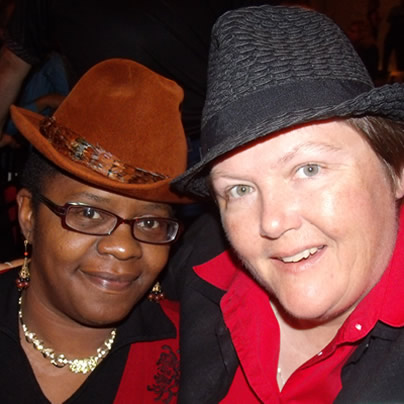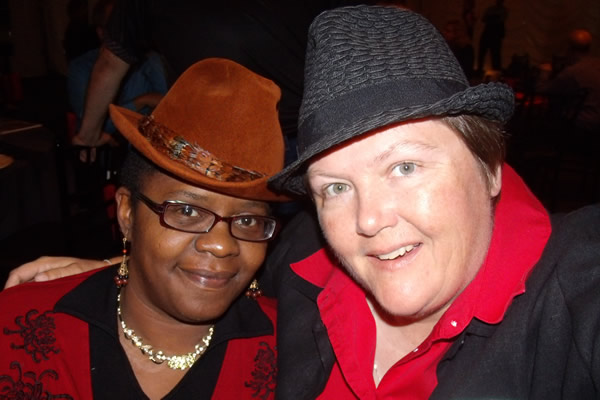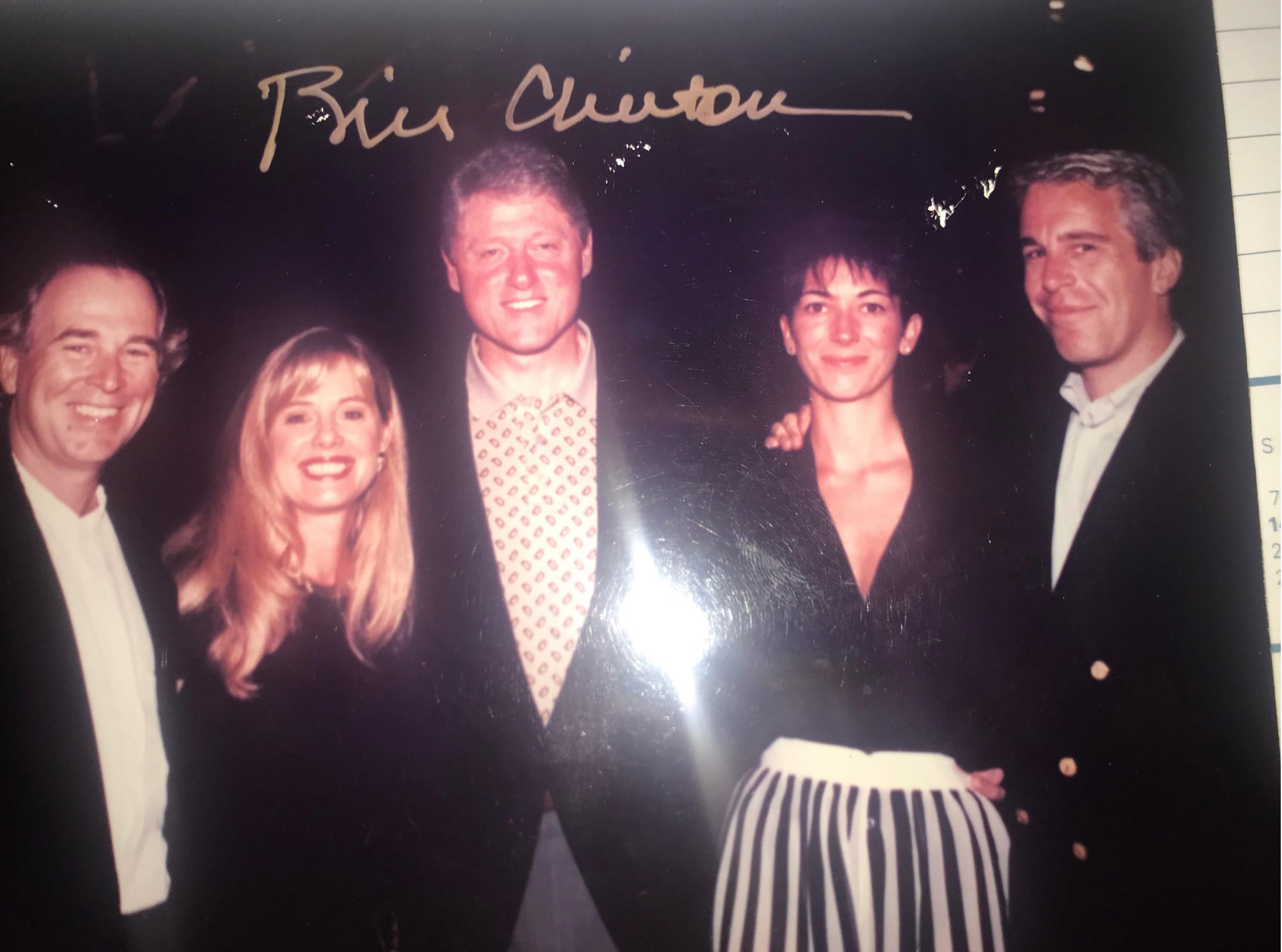News
Wisconsin latest state to face marriage lawsuit
‘Evasion’ statute prohibits couples from going elsewhere to wed


Charvonne Kemp (left) and Marie Carlson filed a lawsuit in Wisconsin seeking marriage rights. (Photo courtesy of the American Civil Liberties Union)
Same-sex couples in Wisconsin joined others throughout the country on Monday in filing a lawsuit seeking same-sex marriage, but efforts there are unique because of the penalties for marrying in another jurisdiction.
The litigation seeks not only to overturn the state’s 2006 constitutional amendment barring same-sex marriage, but also to enjoin state official from enforcing a “marriage evasion law” prohibiting couples — gay and straight — from going elsewhere to marry if the marriage would be prohibited in the state.
The penalties of violating the marriage evasion law in Wisconsin, which is the only state to have such a statute, include up to $10,000 in fines and nine months in prison.
For Marie Carlson, one-half of one of the couples participating in the lawsuit, the marriage evasion law is of concern as she seeks recognition of her relationship with Charvonne Kemp.
“It’s illegal in the state Wisconsin to go another state and get married if you live here,” Carlson said. “I know that it’s not really all that enforced; it’s still something that hangs over your head.”
The marriage evasion law is particularly problematic for same-sex couples in Wisconsin because the Obama administration in most cases has elected to recognize same-sex marriages even if the state doesn’t recognize them — provided these couples are able to marry in a jurisdiction that allows it.
John Knight, a staff attorney with the American Civil Liberties Union’s LGBT project, called the marriage evasion law a “Catch-22” for same-sex couples living in Wisconsin who want to marry.
“Wisconsin is unique in that sense, and so we think that argument particularly exemplifies the harm or the animus toward same-sex couples in some parts of the country,” Knight said.
But for Kemp, it’s not the fear of prosecution for marrying elsewhere that compels her to seek the right marry in Wisconsin, but the ability to wed in the state where she’s lived with her partner for seven years and raised two sons.
“We’re completely in love, and we’d like to be married in the state that we live in,” Kemp said. “We do have options where we could obviously leave the state and go to other states and get married, but we want to be legally recognized where we live.”
The lawsuit, Wolf and Schumacher v. Walker, was filed by the ACLU, the ACLU of Wisconsin and Mayer Brown LLP and is pending before the U.S. District Court for the Western District of Wisconsin.
Like other lawsuits filed throughout the country, the 29-page complaint filed by the groups in Wisconsin alleges the state’s ban on same-sex marriage violates equal protection and due process under the Fourteenth Amendment to the U.S. Constitution.
“Although Wisconsin and this country have taken some steps to reduce discrimination against lesbians and gays, Wisconsin’s ban on marriage for same-sex couples is a striking and continuing vestige of the long history of discrimination toward lesbians and gay men,” the complaint says.
The lawsuit was filed on behalf of four same-sex couples seeking to marry in Wisconsin. Along with Kemp and Carlson, who reside in Milwaukee, they are: Virginia Wolf and Carol Schumacher, who reside in Eau Claire, Wis.; Roy Badger and Garth Wangemann, who live in Milwaukee; and Judith “Judi” Trampf and Katharina “Katy” Heyning, who live in Madison.
Although Wisconsin offers same-sex couples the ability to join in a domestic partnership, enacted in the state in 2009, they don’t offer same the legal rights as marriages.
Carlson said the union isn’t enough because that union provides little assistance beyond certain health insurance benefits — and that’s only if the insurance company recognizes the partnership.
“It also goes along with the fact that last like year, Charvonne’s mother passed away, and we all had to go to New Jersey for a week,” Carlson said. “I had to use vacation time because…the company I work for didn’t recognize she was legally my partner, so I didn’t get bereavement to be able to go. So, I had to use a week of my vacation.”
The office of Wisconsin Gov. Scott Walker (R) didn’t immediately respond to the Washington Blade’s request to comment on the lawsuit.
Wisconsin Attorney General J.B. Van Hollen, however, pledged in a statement to the Blade that he would the defend the marriage amendment.
“This constitutional amendment was approved by a large majority of Wisconsin residents,” Van Hollen said. “I believe the amendment is constitutional, and I will vigorously defend it.”
The Wisconsin litigation is among 40 pending lawsuits in 22 states throughout the country seeking marriage rights for gay couples.
Amid expectations that one will soon reach the U.S. Supreme Court for a final ruling on marriage equality, Knight said it’s possible, but he wouldn’t bet on it.
“It’s one of the possibilities it might go to the Supreme Court, but the chance of that in light of all the other cases out there is probably fairly small,” Knight said. “But it could be.”
Nonetheless, if Walker continues to fight the lawsuit and a high court ruling doesn’t happen before the case is resolved, Kemp said she’s willing to take her case to the Supreme Court to fight for marriage rights across the country if necessary.
“I’m willing to go to the Supreme Court to fight for the right for everyone to be able to get married if that’s what they choose to do,” Kemp said. “It’s about marriage equality for all, not marriage equality for some, or for just us.”
For Kemp, the ability to marry in Wisconsin is not just about the legal rights that marriage would afford, but the dignity of having the access to the same union as other couples.
“However, I want to be married just like everyone else. I want it to be legal, not just for if one of us should get sick and having rights where we’re in the hospital with the other one, but also taxes, all the things that come with marriage, good and bad,” Kemp said.
Chile
Far-right José Antonio Kast elected Chile’s next president
Advocacy group declares ‘state of alert’ over president-elect’s opposition to LGBTQ rights

José Antonio Kast on Sunday won the second round of Chile’s presidential election.
Kast is the far-right leader of the Republican Party who was a member of the country’s House of Deputies from 2002-2018. He defeated Jeannette Jara, a member of the Communist Party of Chile who was former labor and social welfare minister in outgoing President Gabriel Boric’s government, by a 58.2-41.8 percent margin.
The election’s first round took place on Nov. 16.
Kast and Jara faced each other in the runoff after no candidate received at least 50 percent of the vote in the first round. Kast will take office on March 11.
“Under his leadership, we are confident Chile will advance shared priorities to include strengthening public security, ending illegal immigration, and revitalizing our commercial relationship,” said U.S. Secretary of State Marco Rubio on Sunday in a statement. “The United States looks forward to working closely with his administration to deepen our partnership and promote shared prosperity in our hemisphere.”
The Washington Blade has previously reported Kast has expressed his opposition to gender-specific policies, comprehensive sex education, and reforms to Chile’s anti-discrimination laws. The president-elect has also publicly opposed the country’s marriage equality law that took effect in 2022.
The Movement for Homosexual Integration and Liberation, a Chilean LGBTQ and intersex rights group known by the acronym Movilh, in a statement acknowledged the election result. Movilh also declared a “state of alert, given this leader’s (Kast’s) public and political trajectory, characterized for decades by systematic opposition to laws and policies aimed at equality and nondiscrimination of LGBTIQ+ individuals.”
“We urge the president-elect and far-right sectors that follow him to understand and internalize (the fact) that the rights of LGBTIQ+ people are inscribed in the universality of human rights, and they are not built upon an ideology or a political trend,” said Movilh in its statement. “This is not, and never has been, a left-wing or right-wing issue, although some on both sides have gone to great lengths to suggest otherwise, without any basis other than their own partisan or electoral aspirations.”
Organizado Trans Diversidades, a group that advocates on behalf of trans and nonbinary Chileans, on social media said it will “continue the fight for our community’s human rights.”
Virginia
DOJ seeks to join lawsuit against Loudoun County over trans student in locker room
Three male high school students suspended after complaining about classmate

The Justice Department has asked to join a federal lawsuit against Loudoun County Public Schools over the way it handled the case of three male high school students who complained about a transgender student in a boys’ locker room.
The Washington Blade earlier this year reported Loudoun County public schools suspended the three boys and launched a Title IX investigation into whether they sexually harassed the student after they said they felt uncomfortable with their classmate in the locker room at Stone Bridge High School in Ashburn.
The parents of two of the boys filed a lawsuit against Loudoun County public schools in U.S. District Court for the Eastern District of Virginia in Alexandria. The Richmond-based Founding Freedoms Law Center and America First Legal, which White House deputy chief of staff Stephen Miller co-founded, represent them.
The Justice Department in a Dec. 8 press release announced that “it filed legal action against the Loudoun County (Va.) School Board (Loudoun County) for its denial of equal protection based on religion.”
“The suit alleges that Loudoun County applied Policy 8040, which requires students and faculty to accept and promote gender ideology, to two Christian, male students in violation of the Equal Protection Clause of the 14th Amendment to the U.S. Constitution,” reads the press release.
Assistant Attorney General Harmeet K. Dhillon of the Justice Department’s Civil Rights Division in the press release said “students do not shed their First Amendment rights at the schoolhouse gate.”
“Loudoun County’s decision to advance and promote gender ideology tramples on the rights of religious students who cannot embrace ideas that deny biological reality,” said Dhillon.
Outgoing Virginia Gov. Glenn Youngkin and outgoing Virginia Attorney General Jason Miyares in May announced an investigation into the case.
The Virginia Department of Education in 2023 announced the new guidelines for trans and nonbinary students for which Youngkin asked. Equality Virginia and other advocacy groups claim they, among other things, forcibly out trans and nonbinary students.
The U.S. Department of Education’s Office of Civil Rights in February launched an investigation into whether Loudoun County and four other Northern Virginia school districts’ policies in support of trans and nonbinary students violate Title IX and President Donald Trump’s executive order that prohibits federally funded educational institutions from promoting “gender ideology.”
The White House
As house Democrats release Epstein photos, Garcia continues to demand DOJ transparency
Blade this week sat down with gay House Oversight Committee ranking member

Democrats on the House Oversight Committee have released new photos from Jeffrey Epstein’s email and computer records, including images highlighting the relationship between President Donald Trump and the convicted sex offender.
Epstein, a wealthy financier, was found guilty of procuring a child for prostitution and sex trafficking, serving a 13-month prison sentence in 2008. At the time of his death in prison under mysterious circumstances, he was facing charges of sex trafficking and conspiracy to traffic minors.
Among those pictured in Epstein’s digital files are Trump, former President Bill Clinton, former Trump adviser Steve Bannon, actor and director Woody Allen, economist Larry Summers, lawyer Alan Dershowitz, entrepreneurs Richard Branson and Bill Gates, and Andrew Mountbatten-Windsor.
One photo shows Trump alongside Epstein and a woman at a Victoria’s Secret party in New York in 1997. American media outlets have published the image, while Getty Images identified the woman as model Ingrid Seynhaeve.
Oversight Committee Democrats are reviewing the full set of photos and plan to release additional images to the public in the coming days and weeks, emphasizing their commitment to protecting survivors’ identities.
With just a week left for the Justice Department to publish all files related to Epstein following the passage of the Epstein Files Transparency Act, which requires the Justice Department to release most records connected to Epstein investigations, the Washington Blade sat down with U.S. Rep. Robert Garcia (D-Calif.), the ranking member on the Oversight Committee to discuss the current push the release of more documents.
Garcia highlighted the committee’s commitment to transparency and accountability.

“We’ve said anything that we get we’re going to put out. We don’t care who is in the files … if you’ve harmed women and girls, then we’ve got to hold you accountable.”
He noted ongoing questions surrounding Trump’s relationship with Epstein, given their long history and the apparent break in friendship once Trump assumed public office.
“There’s been a lot of questions about … Donald Trump and Jeffrey Epstein. They were best friends for 10 years … met women there and girls.”
Prior to Trump’s presidency, it was widely reported that the two were friends who visited each other’s properties regularly. Additional reporting shows they socialized frequently throughout the 1990s and early 2000s, attending parties at Trump’s Mar-a-Lago resort in Florida and Epstein’s residences. Flight logs from an associate’s trial indicate Trump flew on Epstein’s private jet multiple times, and Epstein claimed Trump first had sex with his future wife, Melania Knauss, aboard the jet.
“We’ve provided evidence … [that leads to] questions about what the relationship was like between Donald Trump and Jeffrey Epstein.”
Garcia stressed the need for answers regarding the White House’s role in withholding information, questioning the sudden change in attitude toward releasing the files given Trump’s campaign promises.
“Why is the White House trying to cover this up? So if he’s not covering for himself … he’s covering up for his rich friends,” Garcia said. “Why the cover up? Who are you hiding for? I think that’s the question.”
He confirmed that Trump is definitively in the Epstein files, though the extent remains unknown, but will be uncovered soon.
“We know that Trump’s in them. Yeah, he’s been told. We know that Trump’s in them in some way. As far as the extent of it … we don’t know.”
Garcia emphasized accountability for all powerful figures implicated, regardless of financial status, political party, or personal connections.
“All these powerful men that are walking around right now … after abusing, in some cases, 14‑ and 15‑year‑old girls, they have to be held accountable,” he said. “There has to be justice for those survivors and the American public deserves the truth about who was involved in that.”
He added that while he is the ranking member, he will ensure the oversight committee will use all available political tools, including subpoenas — potentially even for the president.
“We want to subpoena anyone that we can … everyone’s kind of on the table.”
He also emphasized accountability for all powerful figures implicated, regardless of financial status, political party, or relationship with the president.
“For me, they’re about justice and doing the right thing,” Garcia said. “This is about women who … were girls and children when they were being abused, trafficked, in some cases, raped. And these women deserve justice.”
“The survivors are strong.”
Deputy White House Press Secretary Abigail Jackson issued a statement regarding the release the photos, echoing previous comments from Republicans on the timing and framing of the photos by the Oversight Committee.
“Once again, House Democrats are selectively releasing cherry-picked photos with random redactions to try and create a false narrative,” Jackson said.
“The Democrat hoax against President Trump has been repeatedly debunked and the Trump administration has done more for Epstein’s victims than Democrats ever have by repeatedly calling for transparency, releasing thousands of pages of documents, and calling for further investigations into Epstein’s Democrat friends,”
In a press release on Friday, Garcia called for immediate DOJ action:
“It is time to end this White House cover-up and bring justice to the survivors of Jeffrey Epstein and his powerful friends. These disturbing photos raise even more questions about Epstein and his relationships with some of the most powerful men in the world. We will not rest until the American people get the truth. The Department of Justice must release all the files, NOW.”





(Photo courtesy of the U.S. House Oversight Committee)


















